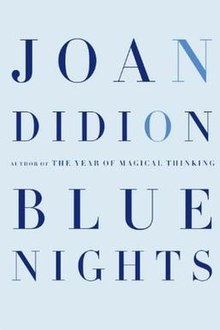Blue Nights
- Joan Didion Blue Nights Pdf
- Joan Didion Daughter Quintana
- Joan Didion Blue Nights Dunne Video
- Joan Didion Blue Nights Epub
- Joan Didion Blue Nights Excerpt
Blue nights refer to the quality of the light during evenings around summer solstice, a time of year which the author feels starts the whole cycle of diminishment and death. The memoir begins with a reminiscence of Quintana's wedding in July 2003 (the same year she falls ill and Dunne dies), as seen 7 years on by Didion. Blue Nights is a memoir by Joan Didion, written after Didion’s daughter died of cancer at age 39. The book’s main focus is Didion’s relationship with her daughter, but it also addresses the author's own childhood and offers some very frank thoughts on old age and mortality in general. Blue Nights sono le ore lunghe e luminose della sera che a New York preannunciano il solstizio d’estate, «l’opposto della morte del fulgore, ma anche il suo annuncio».Sono passati sette anni da quando Joan Didion e John Gregory Dunne festeggiavano il matrimoniodella figlia Quintana Roo nella cattedrale di St. John the Divine in Amsterdam Avenue.
Genre: Memoir


- Annotated by:
- Shafer, Audrey
Didion writes fairly frankly about Quintana's alcohol dependency in Blue Nights, and has referred to her late daughter as 'an alcoholic' in interviews. Much of the book explores Quintana's history. Blue Nights is a 2011 memoir by American author Joan Didion chronicling the unexpected death of Didion’s daughter, Quintana, at age thirty-nine in 2005, and her grieving process thereafter.
- Date of entry: Dec-23-2011
- Last revised: Dec-22-2011
Summary

Joan Didion Blue Nights Pdf
Blue nights refer to the quality of the light during evenings around summer solstice, a time of year which the author feels starts the whole cycle of diminishment and death. The memoir begins with a reminiscence of Quintana's wedding in July 2003 (the same year she falls ill and Dunne dies), as seen 7 years on by Didion. Throughout the description of the wedding are particulars of dress, flowers, design choices and locale which are not only precise, but also hold tremendous meaning to Didion. The branding of clothing, furniture, dishware, hotels etc, is dominant in many parts of the book - the Didion-Dunnes' family life was filled with movie stars, glamorous restaurants, and the hard work of writing. We see Didion on book tours and backstage during the Vanessa Redgrave one woman show of A Year of Magical Thinking.
Although Quintana's death and dying are prominent in the book, her whole life is explored. Issues of her adoption, her mental illness(es), her precociousness and talents, and above all, her relationship with her mother are intimately explored. The reader is given her childhood poems and descriptions of her nightmares and toys.
Another prominent theme is aging. The author was born in 1934, the same year, she notes, as Sophia Loren. Didion experiences neuromuscular problems and describes a particularly frightening episode of loss of consciousness and bleeding. She fears the deterioration of her cognitive abilities and laments she is unable to gain weight. She has a supportive and loving family and network of friends, but ultimately she ponders her aloneness, the lack of someone's name to write down on hospital forms as her emergency contact.
Commentary
Didion uses precise descriptors and phrases as leitmotifs – to capture in shorthand certain scenes and times. These phrases, like “Sara Mankiewicz’s Minton dinner plates,” or “After I became five I never ever dreamed about him,” are repeated numerous times throughout the text, like sporadic choruses or echoes. Didion takes on potential detractors who might feel less sympathetic due to the luxury of Quintana’s upbringing (Didion shops at Saks for baby necessities). She posits that Quintana’s suffering in her illness and dying outweighs any ‘privilege’ she may have experienced as a child and young adult (page 76). Whether one has issues or not with the boutique preciousness of some of the branding, one ultimately has to have an admiration for Didion’s work ethic and her choice to continue to create despite, or perhaps because of, her losses.
Publisher
Place Published
Edition
Joan Didion Daughter Quintana
Page Count
Overview
Joan Didion Blue Nights Dunne Video
A New York Times Notable Book and National BestsellerJoan Didion Blue Nights Epub
From one of our most powerful writers, a work of stunning frankness about losing a daughter.
Richly textured with memories from her own childhood and married life with her husband, John Gregory Dunne, and daughter, Quintana Roo, this new book by Joan Didion is an intensely personal and moving account of her thoughts, fears, and doubts regarding having children, illness and growing old.


Joan Didion Blue Nights Excerpt
As she reflects on her daughter’s life and on her role as a parent, Didion grapples with the candid questions that all parents face, and contemplates her age, something she finds hard to acknowledge, much less accept. Blue Nights—the long, light evening hours that signal the summer solstice, “the opposite of the dying of the brightness, but also its warning”—like The Year of Magical Thinking before it, is an iconic book of incisive and electric honesty, haunting and profound.
'Incantory.... A beautiful condolance note to humanity about some of the painful realities of the human condition.' —The Washington Post
